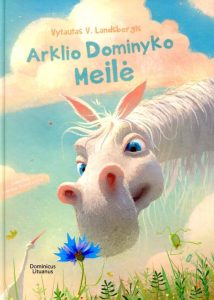The Love of the Horse Dominic

Vytautas V. Landsbergis, Gediminas Pranckevičius. Arklio Dominyko meilė (The love of the horse Dominic), Vilnius: Nieko rimto, 2004; Dominicus Lituanus, 2012, 2015, 2018. – 76 p.
Dominykas the Horse is one of the host of the many anthropomorphised animals that inhabit the world of Vytautas V. Landsbergis’ books, along with Zita the Little Mouse, and Eugenijus the Moose. This book, which won the IBBY award in 2004, was adapted for the theatre, and at the moment it is in the process of being turned into an opera, Dominykas the Horse falls in love with a pretty but rather spoilt cornflower. When the autumn comes, he hides his cornflower under a rock to protect it from the coming frosts, and travels to far away Africa, where he makes a lot of interesting new friends. Finally, he reaches a huge field of cornflowers, from which his beloved comes. However, as the spring approaches, Dominykas goes back, because his love is about to appear from under the rock once again. When she reappears, Dominykas gives her the most beautiful name he can think of, Svajonė, which means Dream.
Vytautas V. Landsbergis (1962) is a sort of Jack-of-all-trades, a filmmaker, musician and theatre director. However, his fame rests on his books for children. His father, Vytautas Landsbergis, is probably the most important political figure in modern Lithuanian independence, but in fact he comes from a very educated and very musical family Both his parents are professional pianists and long-time teachers of music. Landsbergis, who is himself a father of five, indulges little in political activities, but his books for children are loved by parents, because they are so thoughtful and educational. They are loved by children too, because they are such fun and so entertaining. Many of his stories have been adapted with great success for children’s theatres, and, along with Kęstutis Kasparavičius, he is one of the regular contestants in the Book of the Year award.
Gediminas Pranckevičius. Illustrator’s portfolio: https://gedomenas.com/
Selected translations
Georgian: ცხენ დომენიკოს საიყვარული. Translated by Nana Devidze. Tbilisi: Academic Press of Georgia LLC, 2022
Mongolian: Доминик морьхны хайрын туух. Translated from English by Solmon Bayaraa. Ulaanbaatar: Nepko Kids, 2020
Ukrainian: Любов коня Домiнiкаса. Translated by Dmytro Čerednyčenko. Kiev: Grani-T, 2011
Swedish: Dominic – den förälskade hästen. Translated by Anna Harrison. Göteborg: Tranan, 2006
Contact for rights: ramune@dominicus.lt